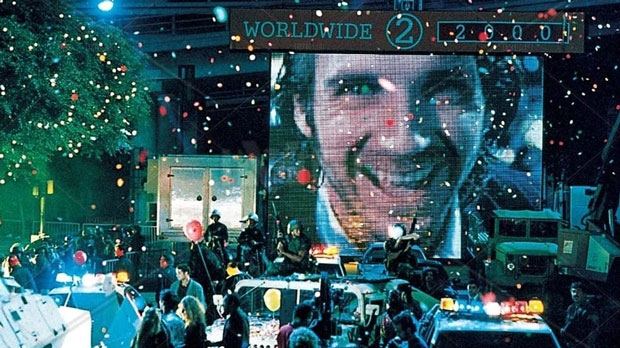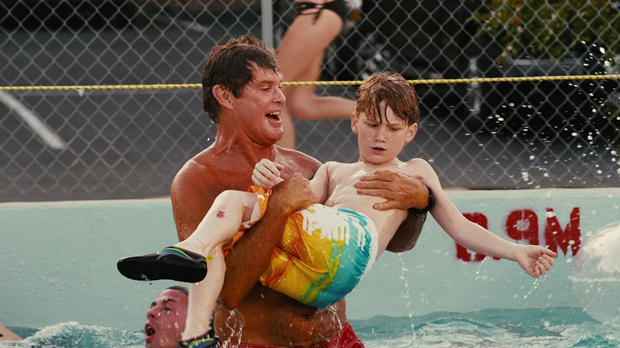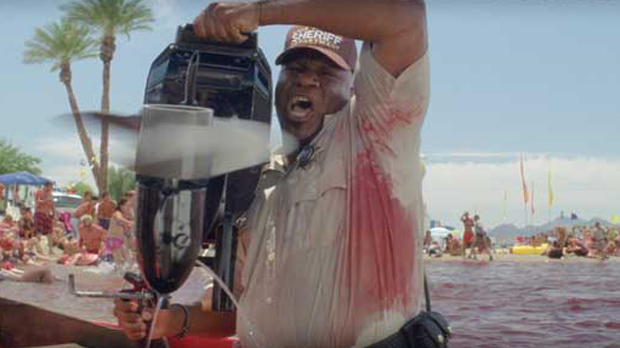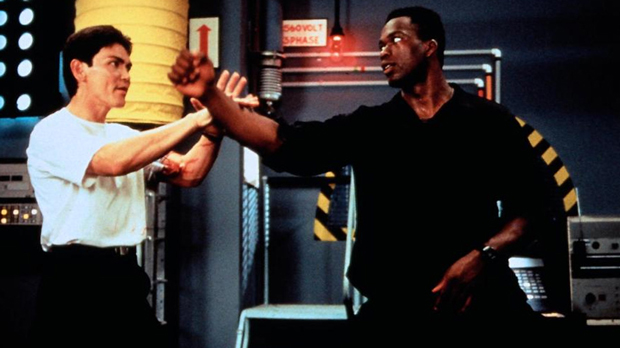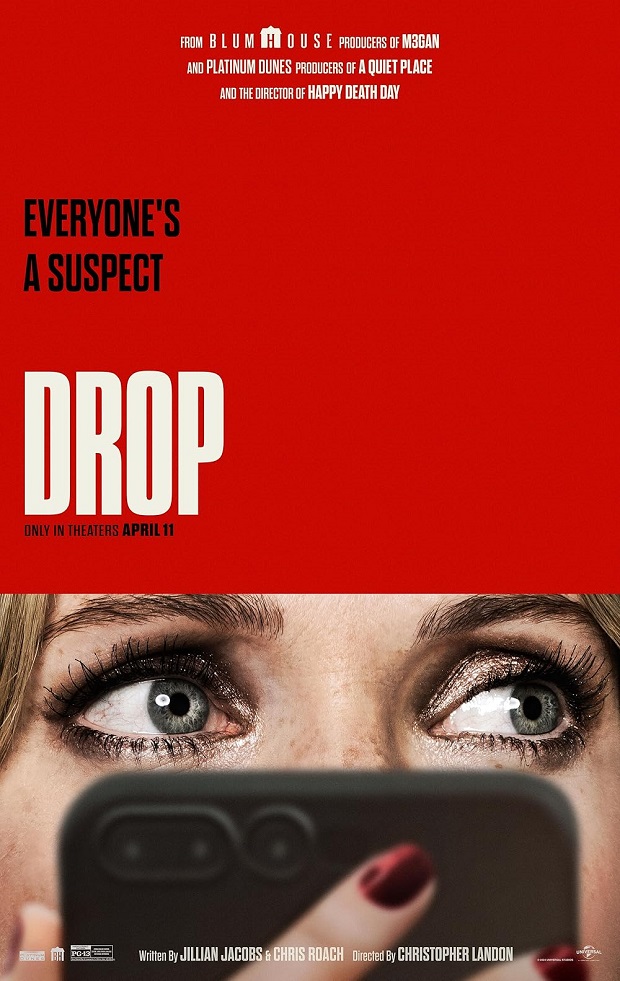 Strange Days (1995) 20th Century Fox/Sci-Fi-Thriller RT: 145 minutes Rated R (intense disturbing violence, sexuality, pervasive strong language) Director: Kathryn Bigelow Screenplay: James Cameron and Jay Cocks Music: Graeme Revell Cinematography: Matthew F. Leonetti Release date: October 13, 1995 (US) Cast: Ralph Fiennes, Angela Bassett, Juliette Lewis, Tom Sizemore, Michael Wincott, Vincent D’Onofrio, Glenn Plummer, Brigitte Bako, Richard Edson, William Fichtner, Josef Sommer, Joe Urla, Nicky Katt, Michael Jace, Louise LeCavalier, David Carrera, Jim Ishida, Todd Graff. Box Office: $7.9M (US)
Strange Days (1995) 20th Century Fox/Sci-Fi-Thriller RT: 145 minutes Rated R (intense disturbing violence, sexuality, pervasive strong language) Director: Kathryn Bigelow Screenplay: James Cameron and Jay Cocks Music: Graeme Revell Cinematography: Matthew F. Leonetti Release date: October 13, 1995 (US) Cast: Ralph Fiennes, Angela Bassett, Juliette Lewis, Tom Sizemore, Michael Wincott, Vincent D’Onofrio, Glenn Plummer, Brigitte Bako, Richard Edson, William Fichtner, Josef Sommer, Joe Urla, Nicky Katt, Michael Jace, Louise LeCavalier, David Carrera, Jim Ishida, Todd Graff. Box Office: $7.9M (US)
Rating: ****
It’s funny how attitudes change over time. I didn’t like Strange Days when it first came out, but now I think it’s brilliant. I experienced something similar with Blade Runner in the 80s. It left me cold when I saw it at 14, but now it’s my favorite sci-fi movie of all-time next to 2001: A Space Odyssey. While I wouldn’t put Strange Days on that high a level, it easily makes my top ten. It’s not an easy watch with its heavy ideas and brutal violence. The shaky camerawork in some scenes is dizzying. You may experience vertigo while watching it. If you can get past all this, you’re in for one trippy ride.
Before I get into the plot, I should explain a few things about the tech-heavy/noir-drenched world depicted in Strange Days. The drug of choice in then-futuristic 1999 is being “wired” or “jacked in” to other people’s memories or experiences. They’re recorded on small discs by a headpiece called a SQUID (Superconducting Quantum Interference Device) that connects to the wearer’s cerebral cortex. The discs are then sold for “playback” by black marketeers like ex-cop Lenny Nero (Fiennes, Schindler’s List) looking to make a buck off enabling customers to live vicariously through the experiences of others. Of course, it’s highly illegal.
Set in the final two days of the millennium, Strange Days depicts a Los Angeles marked by crime, rioting, looting and heavy police presence. It’s in turmoil over the execution-style murder of politically-charged rapper Jeriko One (Plummer, Showgirls). In the midst of the chaos, Lenny goes about his business as usual. He’s a mess in every sense. He stays out all night dealing product. He comes home in the wee hours of the morning and drinks himself to sleep while viewing clips of his ex-girlfriend, nightclub singer Faith (Lewis, Natural Born Killers). He’s still in love with her even though she left him for wealthy but psychotic music producer Philo Gant (Wincott, The Crow).
An old friend, a strung-out hooker named Iris (Bako, Dark Tide), desperately wants to speak with Lenny. She’s being hunted by two dirty cops, Steckler (D’Onofrio, Full Metal Jacket) and Engelman (Fichtner, Heat), who want a recording she made of them doing something terrible. Unfortunately, she’s killed before she can say anything to Lenny. The fact that she’s killed isn’t anywhere near as bad as how she’s killed. She’s attacked by an unseen person that forces her to wear a SQUID so she can experience being raped and murdered from his POV. It heightens her fear which, in turn, heightens the killer’s pleasure. Lenny sees it all on a disc somebody gives him.
Lenny decides to try and track down the person responsible. He gets help from his best friend Mace (Bassett, What’s Love Got to Do with It), a limo driver who’s in love with Lenny even though she vehemently disapproves of the dirty business he’s in. In his defense, he doesn’t deal in “blackjack”- i.e. snuff footage. Also in his corner, fellow ex-cop- turned-private investigator Max (Sizemore, Natural Born Killers) who’s been hired by super-paranoid Philo to follow Faith. Together, they try to make sense of all that going’s on as the clock ticks down to Y2K.
I can think of several adjectives to describe Strange Days: weird, perverse, edgy, intense, hypnotic, daring, dazzling, paranoid, prescient, provocative and smart. It all goes to describe a wholly unique cinematic experience that was totally misunderstood when first released. Directed by Kathryn Bigelow (Point Break) and co-written by ex-husband James Cameron (The Terminator), it’s an ambitious piece that nearly derailed her career when it tanked at the box office. Its meager $7.9 million take didn’t even put a dent in its $42 million budget. It wasn’t at all what I expected from the director of Near Dark (another unfairly overlooked movie), Blue Steel and Point Break. I didn’t like it, but I never forgot it. When that happens, it means I need to give the movie in question another look. It doesn’t always pay off, but this time it did.
Bigelow starts off Strange Days on just the right note with a high-kinetic scene of a robbery gone wrong. It’s shown from the perspective of a participant wearing a SQUID. We see the robbers gearing up for the job in a car. We see them enter a Chinese restaurant through the kitchen with guns drawn, demanding money and roughing up victims until the police arrive. We watch as they’re chased by the cops. We gasp when the unseen participant falls from a building rooftop to his death. All of it is filmed with a hand-held camera that gives the viewer the sense of being in the thick of the action. It’s one of many visually exciting sequences in an atmospherically rich film that takes the viewer on a tour through dangerous city streets, grungy clubs and seedy hotels as Lenny divides his time between dealing product and trying to save Faith from the danger she’s supposedly in. The action moves to a thumping techno-beat by composer Graeme Revell (The Crow). It’s a wondrous blend of sight and sound. The innovative technical artistry that went into Strange Days is nothing short of AWESOME.
Bigelow couldn’t have done a better job with casting. Fiennes imbues his character with equal parts charm and sleaze, cowardice and craftiness as he hustles, wheedles and cajoles his way through life. He’s the very personification of the central paradox of VR (virtual reality). You can’t experience somebody else’s reality without abandoning your own. Scenes like the one where Lenny watches a virgin customer jack in for the first time serve as a critique of our society’s ever-growing addiction to living through technology.
Bassett is in full bad ass mode here as Lenny’s best friend and moral backbone. She refuses to mess around with “that wired s***“, preferring to remain grounded in classical reality. Lenny’s so immersed in reliving the past with his ex via clips, he doesn’t see that Mace is in love with him. Lewis brings her spacy persona to Faith. She does her own singing and it’s quite good actually. Wincott is at his slimy best. D’Onofrio embodies pure evil as a racist L.A. cop. Sizemore turns in a solid performance as a PI who shouldn’t be trusted. This is NOT a spoiler. Rather, it’s a given by virtue of his profession.
What’s most interesting about Strange Days now is how eerily relevant it is to today’s times with its themes of racial injustice, police brutality and technology taking over. It’s like Bigelow, Cameron and co-writer Jay Cocks (The Age of Innocence) looked into a crystal ball and saw the racial tensions, anti-police attitudes, cell phone videos and rioting in the streets that would come to define these times. It’s crazy how Strange Days connects to the BLM movement and our complete dependence on technology. This is what makes great sci-fi. I love how the makers take it all and drench it in noir conventions like Blade Runner before it. It really is an extraordinary film on several levels. It’s both entertaining and thought-provoking. In a word, it’s BRILLIANT!
